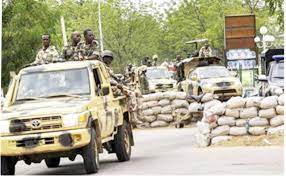For years, Nigeria has struggled with insecurity and corruption, two problems that have badly affected the country’s economy and its people. Despite efforts by the government to address these issues, they remain a major challenge for the nation. Now, as Nigeria faces a new set of challenges, the future of the country looks uncertain.
The Nigerian military has been praised for its efforts to combat insecurity and protect the country’s citizens. However, recent revelations of corruption within the military have raised troubling questions about the true motivations of the military. With allegations of bribery, and embezzlement, the question now becomes: Are the military’s efforts to protect the country truly selfless, or are they being driven by personal greed?
A shadow of corruption is falling over some military, also raising questions about its true purpose. And it seems that the military may not be as committed to the country’s security as it once appeared. Are the military’s efforts motivated by a desire to protect Nigeria, or by a lust for power and wealth? For many travelers and drivers in Nigeria, a stop at a military checkpoint can be a source of anxiety and dread. Many officials are known to request bribes from travelers in exchange for a smooth journey. But what happens when these demands go too far?
Nighttime brings a new level of danger for travelers and drivers in Nigeria. Not only are the roads more dangerous, but the threat of corruption at military checkpoints is also heightened. In the darkness, some officials are more likely to request bribes, knowing that their actions are less likely to be seen or reported. But what is the cost of this corruption, both for the individuals affected and for the country as a whole?
Bribery by military personnel at checking points can have a number of serious consequences. First, it undermines the military’s credibility and reputation, making it harder for the military to carry out its mission effectively. Furthermore, it creates a dangerous environment for the public, who may be targeted by criminals or corrupt officials. Additionally, it can lead to an increase in crime and violence, as corrupt officials may use their power to extort money or goods from travelers. Moreover, it can lead to a loss of public trust in the military and the government.
Another danger, at nighttime checkpoints is the increased risk of unlicensed drivers. Many unlicensed drivers take advantage of the lack of oversight at night to operate vehicles without proper training or knowledge of the rules of the road. This can lead to accidents, injuries, and even fatalities. Lastly, unlicensed drivers often do not have the proper insurance coverage, which can leave victims without financial support after an accident. This can have serious consequences for the stability of the country.
There are few possible solutions that includes, one increase of training and oversight for military officials working at the checkpoints. This could include regular inspections to ensure that officials are following proper procedures and that there is no corruption. Another is increasing penalties for officials caught taking bribes.
Increased transparency and accountability could be implemented. This could include regular reports on the performance of military checkpoints and how they are operating. Another solution could be a public awareness campaign to educate travelers about their rights and what to do if they are asked for a bribe. Lastly solution to this issue, is stricter enforcement of licensing laws for drivers. This would make it more difficult for unlicensed drivers to operate vehicles and would reduce the risks for travelers.
Fadeela Mustapha Lawan,
Department of Mass Communication, Borno State University, Maiduguri
| ReplyForward |




